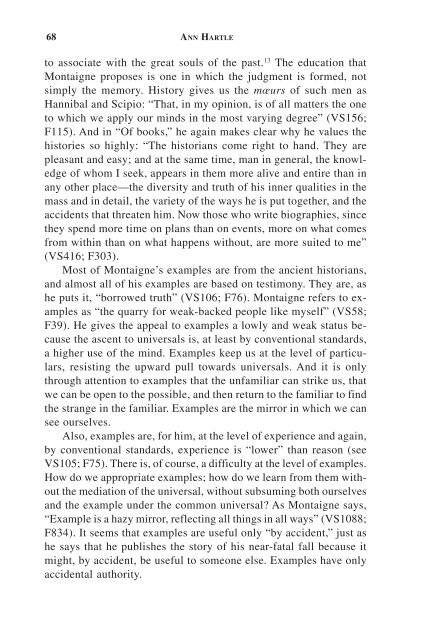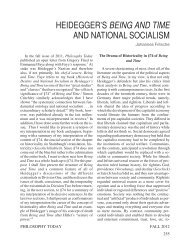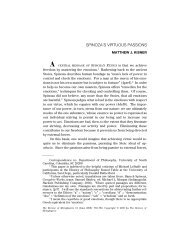The Essay as Self-Knowledge: Montaigne's Philosophical ...
The Essay as Self-Knowledge: Montaigne's Philosophical ...
The Essay as Self-Knowledge: Montaigne's Philosophical ...
Create successful ePaper yourself
Turn your PDF publications into a flip-book with our unique Google optimized e-Paper software.
68 ANN HARTLE<br />
to <strong>as</strong>sociate with the great souls of the p<strong>as</strong>t. 13 <strong>The</strong> education that<br />
Montaigne proposes is one in which the judgment is formed, not<br />
simply the memory. History gives us the mœurs of such men <strong>as</strong><br />
Hannibal and Scipio: “That, in my opinion, is of all matters the one<br />
to which we apply our minds in the most varying degree” (VS156;<br />
F115). And in “Of books,” he again makes clear why he values the<br />
histories so highly: “<strong>The</strong> historians come right to hand. <strong>The</strong>y are<br />
ple<strong>as</strong>ant and e<strong>as</strong>y; and at the same time, man in general, the knowledge<br />
of whom I seek, appears in them more alive and entire than in<br />
any other place—the diversity and truth of his inner qualities in the<br />
m<strong>as</strong>s and in detail, the variety of the ways he is put together, and the<br />
accidents that threaten him. Now those who write biographies, since<br />
they spend more time on plans than on events, more on what comes<br />
from within than on what happens without, are more suited to me”<br />
(VS416; F303).<br />
Most of Montaigne’s examples are from the ancient historians,<br />
and almost all of his examples are b<strong>as</strong>ed on testimony. <strong>The</strong>y are, <strong>as</strong><br />
he puts it, “borrowed truth” (VS106; F76). Montaigne refers to examples<br />
<strong>as</strong> “the quarry for weak-backed people like myself” (VS58;<br />
F39). He gives the appeal to examples a lowly and weak status because<br />
the <strong>as</strong>cent to universals is, at le<strong>as</strong>t by conventional standards,<br />
a higher use of the mind. Examples keep us at the level of particulars,<br />
resisting the upward pull towards universals. And it is only<br />
through attention to examples that the unfamiliar can strike us, that<br />
we can be open to the possible, and then return to the familiar to find<br />
the strange in the familiar. Examples are the mirror in which we can<br />
see ourselves.<br />
Also, examples are, for him, at the level of experience and again,<br />
by conventional standards, experience is “lower” than re<strong>as</strong>on (see<br />
VS105; F75). <strong>The</strong>re is, of course, a difficulty at the level of examples.<br />
How do we appropriate examples; how do we learn from them without<br />
the mediation of the universal, without subsuming both ourselves<br />
and the example under the common universal? As Montaigne says,<br />
“Example is a hazy mirror, reflecting all things in all ways” (VS1088;<br />
F834). It seems that examples are useful only “by accident,” just <strong>as</strong><br />
he says that he publishes the story of his near-fatal fall because it<br />
might, by accident, be useful to someone else. Examples have only<br />
accidental authority.

















